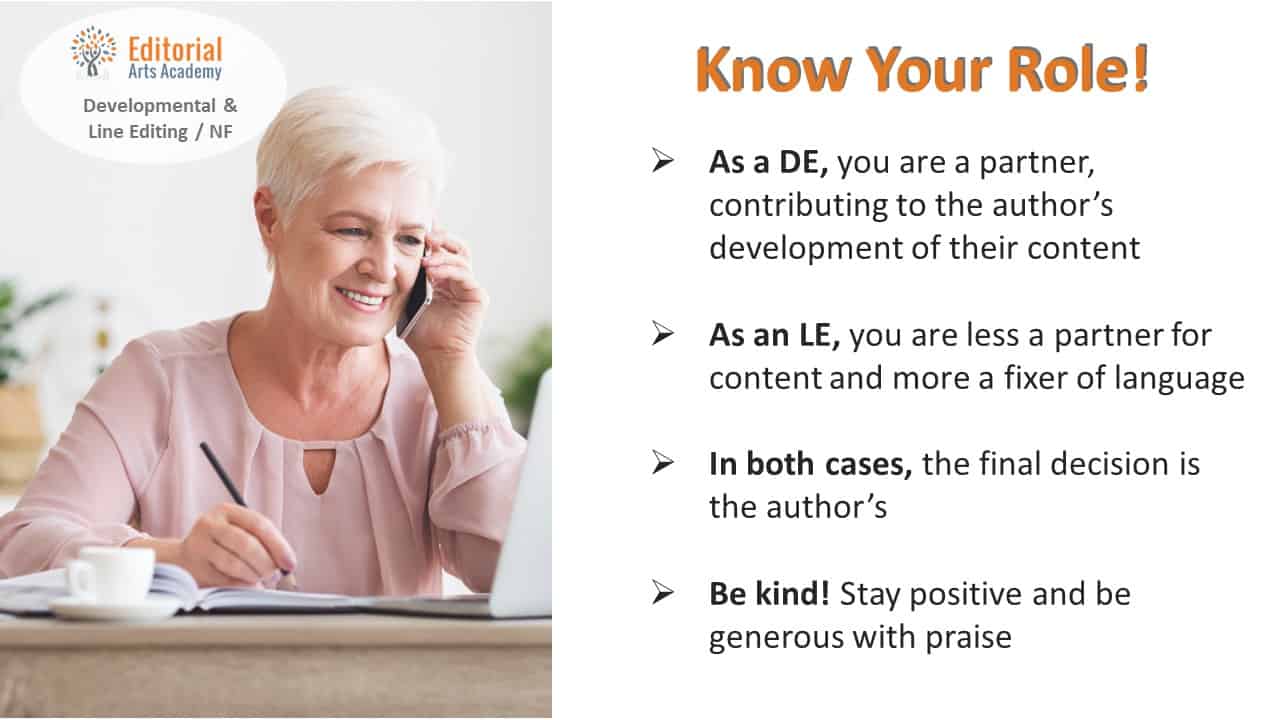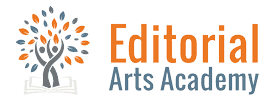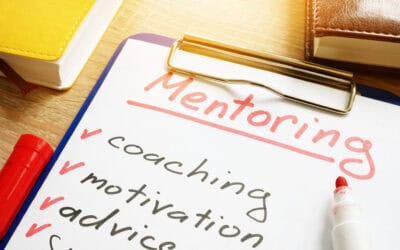Editor’s Note: This course is not currently open for registration, but we will likely reopen it in the later months of 2021.

Nonfiction developmental editor Nancy Marriott teaches a developmental and line editing course this fall
When I tell colleagues about my specialty of developmental and line editing for nonfiction books, I’m often asked, “But where do you get the confidence to make those kinds of big edits in an author’s manuscript?” And then, “I’d be too intimidated to do that. After all, I’m not a better writer than they are!”
They probably think I’m a writer myself, or someone high up in the editing-know-how echelons, to be able to give feedback and make changes required in developmental editing. But I’m not.
If anything, I’m a good reader. A high-volume reader. An omnivorous reader. I love to read, and that, believe it or not, is the first requirement for a good developmental editor.
Developmental Editing and Line Editing Are Skills
Being a reader is the foundation. But there’s quite a lot to learn in honing the skill of developmental editing (DE) and line editing (LE). And interestingly, after I combed the internet, I could find no such classes offering skill training in DE/LE exclusively for nonfiction trade books. So I rolled up my sleeves and created one: Developmental and Line Editing for Popular Nonfiction Books. It starts September 29, 2020, over Zoom, and meets weekly for six weeks.
Before I give you a tour of this exciting class, let me unpack these two kinds of editing, DE and LE. Although DE always comes first, followed by LE, they are often provided as a bundled service for authors.
Two Types of Editing: Developmental and Line Editing
In broadest terms, DE involves the content of a book, and LE involves the language. The purpose of both is to revise an author’s work, not to rewrite or correct it.
- When I work on developing nonfiction content, I look at global, big-picture issues, such as sequence of ideas, order of presentation of ideas, gaps or missing information, rambling sections where much could be left unsaid, repetition of material, and more.
- When I do a line edit, I pay attention to the language of the content, not so much its correctness but its smoothness, clarity, and variation. I want the author’s words to flow with speed, grace, accuracy, and simplicity.
Because these two kinds of editing go hand in hand from a marketing viewpoint, I encourage developmental editors to be trained in both so they can offer line editing to their clients once the DE is done.
Authors Write, You Edit
There is one thing DE/LE definitely is not: writing. Your job is to revise what has already been written by the author, not write anything new. Sure, you’ll change a sentence, suggest a topic, question a paragraph . . . but that’s it, as far as writing goes. Authors write, you edit, which means revising, questioning, and suggesting—all the while working with the material you’ve been given and adding nothing of your own (save the occasional phrase).
Skill Training in Developmental and Line Editing
In my upcoming class, Developmental and Line Editing for Popular Nonfiction Books, you’ll get the skill training you need for offering these services to your authors. The focus of the class is on nonfiction trade books (not technical, medical, or academic books). Genres relevant to this class include:
- Self-help, sometimes called “prescriptive nonfiction,” such as The Four Agreements: A Practical Guide to Personal Freedom by Don Miguel Ruiz
- Memoirs with a teaching focus, such as How to Be an Antiracist by Ibram X. Kendi
- Historical/biographical books, such as Alexander Hamilton by Ron Chernow
- Journalistic “big idea” books that investigate a particular question, such as Talking to Strangers by Malcolm Gladwell
If you want to acquire or develop your DE/LE skills as a freelancer, this class is for you. You’ll have a chance to see samples of developmental editing and try your hand at a line edit of a nonfiction manuscript with direction from an expert in the field. Weekly assignments will help you sharpen your skills in bringing clarity, conciseness, and creative expression to a manuscript’s content and language. The class will wrap up with how to start and build your business in freelance DE/LE book editing, a growing field with increasing opportunities.
Take the Tour!
Developmental and Line Editing for Popular Nonfiction Books is offered synchronously (live) over the Zoom platform, and includes lectures with accompanying PowerPoint slides, discussion, practical applications and practice, and downloads of samples and templates you can use with your clients.
Here’s a week-by-week tour of the class contents.

Introductory slide from Lesson 1.1
Week 1: The Territory
- Lesson 1.1: “Are Developmental and Line Editing for You?” After brief student introductions, you’re oriented to the skills of developmental and line editing, and how you might already possess what it takes to excel. We then bust the three myths people believe about developmental editing, freeing you to pursue DE/LE with greater confidence.
- Lesson 1.2: “The Territory.” You’re introduced to the 7 Editorial Roles and how DE/LE fits in to the continuum of the editing process. We also go over definitions of developmental editing and line editing—what each is and isn’t.
- Lesson 1.3: “The Nonfiction Book.” Since DE is the big-picture view, we map the contents and layout of a typical nonfiction book and also explore structures for subgenres, such as teaching memoir and self-help.
Week 2: The How-To of Developmental Editing
- Lesson 2.1: “Overview and Steps.” I provide an overview of the basic steps for doing a developmental edit and how to evaluate a manuscript to know if it’s ready for DE.
- Lesson 2.2: “Writing the Editorial Letter.” You learn the formula for writing developmental feedback and the process for implementing changes, as well as do’s and don’ts of writing in-text commentary and author queries.
- Lesson 2.3: “Technical Aspects.” We go over Track Changes, a powerful editing tool in Microsoft Word. I explain how to utilize it when editing in the manuscript and what to expect from your clients when they use it. I also cover how to deal with numerous editorial “rounds” in a timely and economical way.

A slide from Lesson 2.1, Overview and Steps
Week 3: The How-To of Line Editing
- Lesson 3.1: “Revise, Don’t Correct.” We cover the elements of language involved in a line edit (using figurative and literal language, eliminating repetition and unnecessary jargon, word choice, etc.) and how and when to query an author when improving their words.
- Lesson 3.2: “Steps of a Line Edit.” You learn how to evaluate if the manuscript is ready, explore the major differences between a line edit and a copyedit, and get to practice line editing on a manuscript with my over-the-shoulder guidance.
- Lesson 3.3: “Mastering Sentence Structure, Grammar, and All That Jazz.” You get a painless tutorial on mechanical aspects of line editing to create flow, clarity, and grace, the foundational elements of a good line edit. A short grammar self-assessment will reveal whether you need to brush up on the mechanics of language.
Week 4: Office Hours with Instructor
Come to the Zoom class with your completed assignments and further questions for a one-on-one opportunity to get answers.
Week 5: Best Practices for Creating Positive Relationships with Authors
- Lesson 4.1: “Your Role and Mindset.” You learn best practices when relating to authors, including people skills for positive communication (which can make such a difference!). Also covered: to coach or not to coach — defining your role.
- Lesson 4.2: “Creating Contracts and Schedules.” We go over project management, including negotiating agreements, creating editorial schedules to keep authors on track, and how to limit extra time.
- Lesson 4.3: “Editing the Book Proposal.” You’ll get a template for creating winning book proposals, giving you an additional income-generating service to offer clients.

A slide from Lesson 4.1, Your Role and Mindset
Week 6: Running Your Successful Developmental and Line Editing Business
- Lesson 5.1: “Your Freelance Life.” I offer direction for getting started in a home office, finding work, getting paid, and running your business. We look at the differences between working directly with authors and working with publishers, and how DE/LE jobs sometimes occur as a combination of the two.
- Lesson 5.2: “Expanding Your Revenue Streams.” We explore other services that fit naturally with DE/LE, such as coaching, collaborating, and ghostwriting.
- Lesson 5.3: “Where to Go from Here.” I direct you to further training and opportunities, including an exciting mentorship opportunity with Editorial Arts Academy. We end with a Q&A.
Schedule of Classes
Six Tuesday sessions. Meet remotely on the Zoom platform.
- September 29, 2020, 6:30–8:30pm Eastern
- October 6, 2020, 6:30–8:30pm Eastern
- October 13, 2020, 6:30–8:30pm Eastern
- October 20, 2020, 6:30–8:30pm Eastern
- October 27, 2020, 6:30–8:30pm Eastern
- November 3, 2020 6:30–8:30pm Eastern
How to Register
If you’re ready to get trained in developmental and line editing for popular nonfiction books, register for this course by clicking the button below.
Cost is $275 and includes five lectures with slides, all materials, and a special Office Hours session for live interaction with your instructor and feedback on your work.



